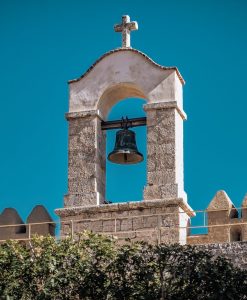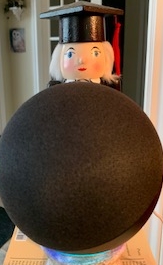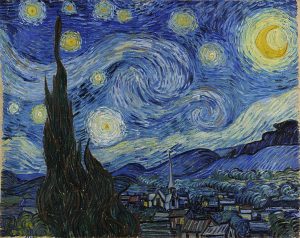


“Any man’s death diminishes me, for I am involved in mankind. And therefore never send to know for whom the bell tolls; it tolls for thee.”
– John Donne
If life has taught me anything, it’s that we are connected, not only to our own little circle, but also to someone who may be living half way across the world. In our digital age, pictures of war in Ukraine can be beamed by satellite in seconds, and we all experience their tragedy.
Our connection is also evident when you study the history of great inventions. Many times the original inventor comes up with only a germ of an idea. But that idea gets picked up by another person who greatly enhances it so that it is now relevant and marketable to the general public. We’ve seen that, as all the small practices of our household can contribute to a giant problem with waste that now affects everyone’s environment.
Scientists connect galaxies and all living things as coming from a single point before the big bang 13.7 billion years ago. So it makes sense that what I do may have consequences for someone far away from me in either place or time. And spiritually, as part of humanity, we are children of God who can reach out to Him and each other through unseen channels of prayer, love and grace.
“From one man he made every nation of men, that they should inhabit the whole earth; and he determined the times set for them and the exact places where they should live. God did this so that men would seek him and perhaps reach out for him and find him, though he is not far from each one of us. For in him we live and move and have our being.’ As some of your own poets have said, `We are his offspring.’ Acts 17:26-28
Our being here is no accident of random chance. Many of those we knew of the older generations have passed on, but each person was unique. We remember their kindness or perseverance, or quirks. There are no replacements, and so we grieve.
If we are diminished by those we have lost, it is also conversely true that we are gifted whenever there is new life. A friend sent a happy text this morning to announce the arrival of her new grand-daughter. Several degrees of separation away, I can still share her joy.
Our local hospital has a custom of announcing the birth of a new baby by broadcasting the bells of a lullaby over their intercom. It’s a cheery note of hope that makes us smile when we hear it. Bells were messengers that announced departures, and it’s a nice touch to have them proclaim new arrivals. Either way, it’s a reminder that life is a very precious gift.

 Sing the Poem
Sing the Poem
It’s in the rhyming,
Or maybe in the timing,
But the throbbing of the beat
Sets to tap-tapping my feet.
Poet, ply and play your trade
With poetry you have made.
Come sing with us, sun and moon!
Come dance on the lilt of the tune.
Spring is still several weeks away, but there’s something about its approach that already lightens my mood in anticipation. Soon heavy winter gear and wool sweaters can be stored away for another season. And I look forward to a resurrection of new life as plants and trees rouse themselves from their long sleep to again fill the world with riotous colour.
Spring has its own challenges, true. The force of nature in springtime can feel wild and chaotic and determined. It will be wonderful to see the birds building their nests, but our resident woodpecker began yesterday, once more, to drill into our deck siding. There’s work to be done in springtime, planting of gardens, grass to cut.
Winter has its icy dangers, but I am always aware of our vulnerability in spring and summer as we move outdoors. Life seems teeming and reckless in its abandon. At least once in springtime, I will feel an overwhelming wave of sadness. Spring and summer, when we are freer, can feel dangerous. It’s more difficult to enclose and protect our loved ones from harm.
But in spring, sorrows don’t stay for long. They recede in the warmth of the sun, in the breeze that caresses us like a lover and invites us once again to live our own lives fully. Eternity is forever, but our time here is so limited that we want to take in all that we can. As the poet Mary Oliver asked, “what is it you plan to do with your one wild and precious life?”
And even if no one else is around, we can turn up the music and dance while we do our household chores. We can dance in the dark, under the stars, in sacred solitude.

“There is nothing concealed that will not be disclosed, or hidden that will not be made known. What you have said in the dark will be heard in the daylight, and what you have whispered in the ear in the inner rooms will be proclaimed from the roofs.” Luke 12:3
Jesus is speaking to the Pharisees, the learned men of his day, who appeared respectable in society, but whose corrupt inner lives would eventually be exposed for all to see. This Bible story is thousands of years old, but it’s amazing how much it can speak to our internet era, how more and more our voices can be broadcast from the rooftops (or cell towers, even).
With an eye to the future, our son presented us with an Amazon Echo as a Christmas gift. Certainly it has potential to be a help in our senior years. Alexa is truly very smart and can cheerfully search for any information we need. She can play our favourite music, and turn on the light. She can respond to our whisper with a whisper.
It just feels as if there’s not much privacy left.
Cell phones track our movements, financial transactions leave a trail, photos have geographical co-ordinates encrypted within them. Laptops have webcams. When away from home, you can turn up the heat, start your laundry online. Our car is monitored by afar by the manufacturer, and we receive regular e-mail notifications after checkups. Advertisers track our Google searches and Facebook notes our lingering on a post. It’s as if the whole world is now like a small village, where everybody knows everybody else’s business.
In this kind of environment, we have a real responsibility to live lives of integrity, consistent in both inner and outer lives. More than ever, we also need to be cautious of a careless word, or of airing grievances. It can be amplified instantaneously over the world, echoing off satellites and affecting many more people than ever before.
“You never can tell, when you send a word,
Like an arrow shot from a bow,
By an archer blind, be it cruel or kind,
Just where it may chance to go.
It may pierce the breast of your dearest friend,
Tipped with its poison or balm.
To a stranger’s heart in life’s great mart
It may carry its pain or its calm . . . “
From You Never Can Tell, by Ella Wheeler Wilcox, 1850-1919

February, the shortest month on the calendar, often feels like the longest. It has been aptly dubbed “foreverary.” Winter snows still blanket the landscape, and spring seems far away. As COVID concerns linger in early 2022, our days are spent in obscurity.
Many artists, labouring alone, have known a similar loneliness. Vincent Van Gogh, his talent unappreciated in his lifetime, lamented that, “A great fire burns within me, but no one stops to warm themselves at it, and passers-by only see a wisp of smoke.”
The poet Dante is feeling so weary as he makes his pilgrimage through the Inferno, but his guide Virgil will have none of it.
“Up on your feet!” This is no time to tire!”
my Master cried. “The man who falls asleep
will never waken fame, and his desire
and all his life drift past him like a dream
and the traces of his memory fade from time
like smoke in air, or ripples on a stream.”
(Inferno, Canto 24, 49-51, Hollander)
Though we may never experience their acceptance, we are to be faithful in exercising our gifts. Van Gogh lived in poverty on the fringes of society, and Dante was exiled from his beloved city of Florence. If they could see the scope of their art in the world today, they would be amazed.
Jesus tells the ordinary men who followed him that they, too, must be “up and going.” They have been with him for months as they trekked through the Judean countryside. They have the unique vantage point of eyewitnesses. They suffer through his crucifixion and thrill at his resurrection. Their accounts have a kindling power, though they will suffer for the telling.
When we’re caught in the doldrums, when the February blahs threaten to affect our mood, then it’s time to faithfully do the next right thing. It may seem trifling and insignificant to others. No one else may see what you see.
Who knows what will succeed and what will fail until we make an attempt? When we write a poem, when we create art, we plant a seed for the future that may very well blossom in another place, in another time, for someone yet unborn.